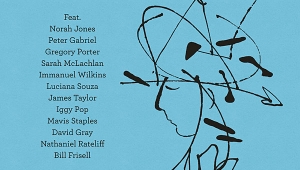| Columns Retired Columns & Blogs |
Recording of September 1995: Reger: Sonatas for Unaccompanied Violin, Vol.2
REGER: Sonatas for Unaccompanied Violin, Vol.2
Op.91 Nos. 1, 3, 5, 6
Ulrike-Anima Mathé, violin
Dorian DOR-90212 (CD only). Sergio Bernal, Douglas Brown, prods.; David H. Walters, Douglas Brown, engs. DDD. TT: 55:30
Op.91 Nos. 1, 3, 5, 6
Ulrike-Anima Mathé, violin
Dorian DOR-90212 (CD only). Sergio Bernal, Douglas Brown, prods.; David H. Walters, Douglas Brown, engs. DDD. TT: 55:30
Robert Hesson ended his July 1993 review of Ulrike-Anima Mathé's first volume of the Op.91 Sonatas for Unaccompanied Violin of Max Reger (1873-1916) with these words: "Let's hope Dorian produces a second volume." Dorian has—and how.
 These challenging, satisfying works have languished, seldom performed and almost never recorded, for the better part of the 20th century—much as J.S. Bach's Sonatas and Partitas for Solo Violin slumbered until reawakened by Mendelssohn and Schumann in the first half of the 19th (albeit with those composers' added piano accompaniments). After Bach's works for unaccompanied strings, the form was not taken up again in any serious way—certainly not by any composer of importance—until Reger himself did more than 150 years later.
These challenging, satisfying works have languished, seldom performed and almost never recorded, for the better part of the 20th century—much as J.S. Bach's Sonatas and Partitas for Solo Violin slumbered until reawakened by Mendelssohn and Schumann in the first half of the 19th (albeit with those composers' added piano accompaniments). After Bach's works for unaccompanied strings, the form was not taken up again in any serious way—certainly not by any composer of importance—until Reger himself did more than 150 years later.
However, these Sonatas are not mere pastiche, imitation, or Bach à la Reger. Though revering Bach above all other composers, Reger brought to the composition of his own works for unaccompanied strings his knowledge and complete digestion of everything that had been written in the interim. (Imagine Mahler composing the first symphony to be written since the "Jupiter.") Here are quiet pools of Schubertian clarity and grace among the contrapuntal thickets, what sounds like a flirtation with the 12-tone row (Sonata 3's Prestissimo), and post-Wagnerian chromatic modulation wielded with wit (the cascading modulations in the Allegro moderato of Sonata 5)—all grounded in fugues (the Allegro energico of Sonata 1) as starkly inevitable as those of Bach himself.
Yes, those fugues...Like Bach, Reger had a strong interest—perhaps an obsession—with counterpoint. His orchestral works are so cross-braced with opposed themes and rhythms that even Reger worried about their "turgidity." Hence the appeal to this strenuously productive composer of clearing the compositional air by writing for solo strings—something he did more than 20 times between 1900 and 1915. The task of convincingly maintaining multiple voices on a single instrument on which only one note at a time can be easily played is difficult enough. (As he described it, "For me, the compositional process involved in writing for the solo violin is like wearing a chastity belt.") That these works are so much more than the dry, academic exercises they were condemned as when first performed—and that Mathé's performances meet them head-on with such loving aggression—add up to a disc that fairly demands praise.
Reger's seven Op.91 Sonatas evince toughness of form, passionate rigor, and a grim joy in formal difficulties overcome that bring to mind the unique sense of accomplishment felt by performer and listener alike at the end of a traversal of the Bach solo works. The four Sonatas recorded here are every bit as thornily rewarding as the three of Vol.1, some of them—especially in the fast movements—downright lyrical in their muscularity. (Though there's nothing here like Sonata 7, which ended Vol.1 with its massive Chaconne's clear debt—repaid with interest—to the Chaconne of Bach's D-minor Partita.) These works have an inner stature hard to reconcile with their virtual ostracism from the standard repertoire. They deserve to be played, recorded, heard, and heard again. Perlman? Shaham? Delmoni? Sitkovetsky? Vengerov? Chee-Yun? Get cracking.
As good as Ulrike-Anima Mathé was on the first set, her playing seems to have matured dramatically in the more than two years between sessions (she's still only 26). Her tone now sounds warmer, fuller, more rounded—a perfect foil for the undiminished astringency of her bite and attack, her well-nigh perfect rubato, and the unerring sense of rhythmic line in which the pulse of these tortuous works is never allowed to falter.
And the sound! This is one of Dorian's most satisfying recordings—they've got the Troy Savings Bank Music Hall down. This recording treads a razor's edge between Dorian's Trojan tendencies (lessened of late) toward bright over-reverberation, and the distant muffledness of their larger-scaled sessions in Dallas's Meyerson venue. The balance is absolutely perfect: Mathé's violin is the sound of a single, inexorable train of thought reverberating through the crystalline space of pure consciousness.
In other words, absolute music of absolute quality. You could do infinitely worse. You can't do better.—Richard Lehnert
- Log in or register to post comments




































